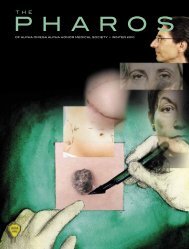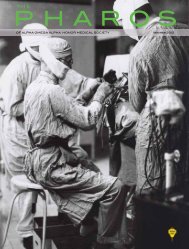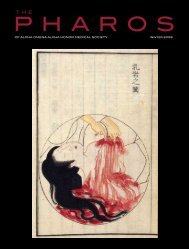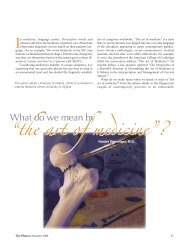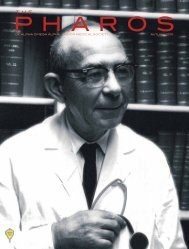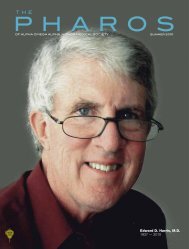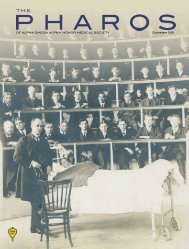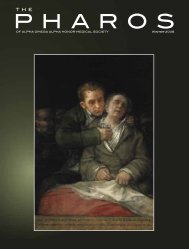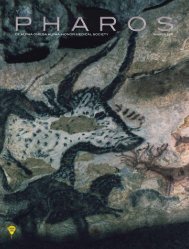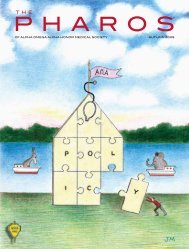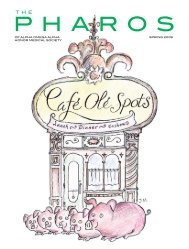The Pharos - Alpha Omega Alpha
The Pharos - Alpha Omega Alpha
The Pharos - Alpha Omega Alpha
Create successful ePaper yourself
Turn your PDF publications into a flip-book with our unique Google optimized e-Paper software.
Beryl Lawn’s work also contains a<br />
strong element of social commentary.<br />
A friend is batted back and forth among<br />
several specialists without<br />
an accurate<br />
diagnosis.<br />
In frustration,<br />
he went to<br />
his veterinarian,<br />
described his symptoms,<br />
gave a<br />
urine specimen,<br />
and was<br />
promptly diagnosed<br />
as having<br />
diabetes. p19<br />
In “Assumptions IV” another friend,<br />
an African American psychiatrist, is<br />
asked for his Medicaid card when he<br />
shows up at an Emergency Room. With<br />
great insight, Dr. Lawn concludes,<br />
As often as I sweep,<br />
the garage never stays<br />
swept and clean<br />
for long.<br />
Like my inner life. p79<br />
Six Rivers<br />
Jenna Le<br />
NYQ Books, <strong>The</strong> New York Quarterly<br />
Foundation, Inc., New York, New York,<br />
2011<br />
Six Rivers is Jenna Le’s first collection.<br />
Dr. Le, the youngest in this group<br />
of physician-poets, is also the most<br />
devoted to traditional poetic forms,<br />
ranging from the European sonnet and<br />
villanelle to the Japanese tanka and haibun.<br />
<strong>The</strong> poet divides her book into<br />
six sections, each named for a river<br />
important in her life, beginning with the<br />
Perfume River, near her family’s home<br />
in central Vietnam. <strong>The</strong> fifth “river”<br />
is the human aorta, around which are<br />
clustered her medical poems. Among<br />
these are the lovely villanelle, “Caesarian<br />
Section,” which celebrates a healthy<br />
new life, and “Elegy,” which mourns the<br />
death of an elderly Nepalese woman.<br />
<strong>The</strong> latter poem also reveals how physicians<br />
can become hardened and detached,<br />
as the radiologist comments on<br />
the difficulty in visualizing the woman’s<br />
intestinal parasites—since they “have<br />
no bones,” p55 —seemingly unconcerned<br />
about the patient herself. <strong>The</strong> ultimate<br />
river is the Styx, where the book ends<br />
appropriately with poems that celebrate<br />
characters from myth and history.<br />
Silent Music<br />
Richard Bronson<br />
Padishah Press, Cold Spring Harbor,<br />
New York, 2009<br />
In Silent Music Richard Bronson reminds<br />
us that, although we live in<br />
a world of ambiguity, we can discover<br />
beauty and meaning in our lives by becoming<br />
aware of “notes/at the edge of<br />
perception—/. . . a new sensibility/. . . a<br />
silent music.” p26<br />
Dr. Bronson, a reproductive endocrinologist,<br />
brings a medical sensibility<br />
to memories of childhood, especially in<br />
such poems as “Father’s Day,” “Imperfect<br />
Knowledge,” and “<strong>The</strong> Pill Closet,”<br />
poignant tributes to his father, a general<br />
practitioner who worked himself,<br />
“black bag in hand,” p20 to an early death.<br />
Having become a facilitator of life,<br />
Richard Bronson celebrates its mystery,<br />
as he writes in “Laboratory-Assisted<br />
Reproduction”:<br />
I have often probed that fecund place,<br />
And in the dark vista of my sonic vision,<br />
Sought the motion of a nascent heart<br />
Bearing witness to life p51<br />
But Dr. Bronson’s narratives also cry<br />
out for justice and deplore violence and<br />
cruelty, as in his eloquent “Cry, Oh Cry<br />
Darfur!” and the touching “Terminal<br />
Velocity.”<br />
Primitive Mood<br />
David Moolten<br />
Truman State University Press,Kirksville,<br />
Missouri, 2009<br />
<strong>The</strong> last selection is the T. S. Eliot<br />
Award-winning Primitive Mood by<br />
David Moolten, a Philadelphia transfusion<br />
medicine specialist. Moolten’s<br />
distinctive style presents the reader with<br />
finely wrought narratives, each telling<br />
a small human story with deep empathy<br />
and compassion, and often with a<br />
palpable sense of gratitude. Whether<br />
he writes of his Jewish grandfather’s response<br />
to Wagner’s music on the radio,<br />
or observing “<strong>The</strong> Girl Without Hands,”<br />
or about a Native American activist who<br />
“drank herself out/Of a smashed marriage,”<br />
p50 Moolten transforms our world<br />
by evoking theirs.<br />
Dr. Moolten’s poems are, in a<br />
<strong>The</strong> <strong>Pharos</strong>/Autumn 2012 41



